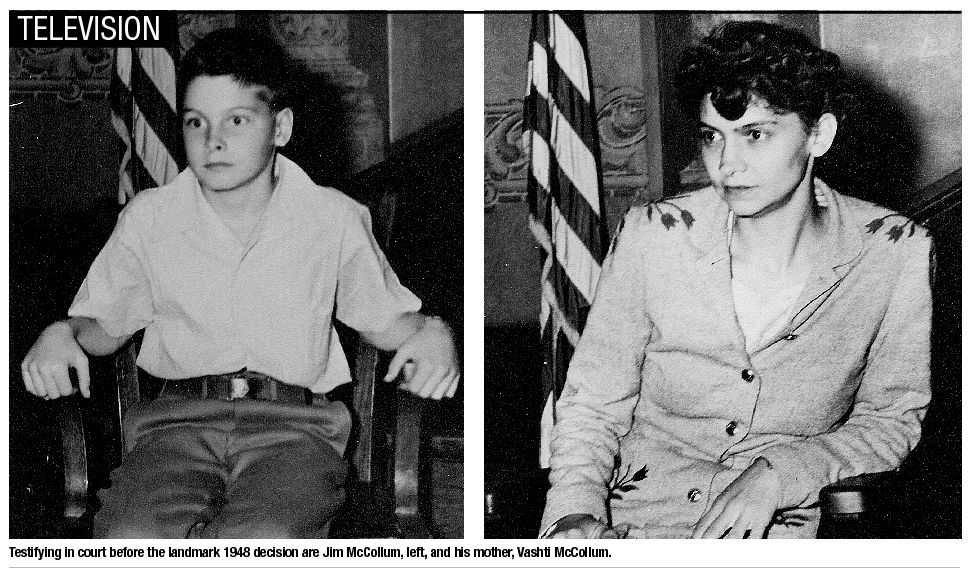
The ‘Angry Atheist of Champaign’
TV documentary examines local case that successfully challenged the First Amendment TELEVISION | Zach Baliva
More than 60 years ago, a landmark ruling established a precedent that would permanently alter the relationship between religion and public education in America. And it happened right here in central Illinois. Jay Rosenstein, an associate professor of journalism at the University of Illinois, retells the story in a recently completed hour-long documentary scheduled to premiere on WILL-TV Oct. 12 at 7 p.m.
Jim McCollum, a fifth-grader in Champaign’s public school system, suffered harassment and beatings when he refused to participate in a voluntary Protestant religion class. Instead of protecting McCollum or offering an alternative, school officials forced the child to sit in the hallway alone during the class. His mother, Vashti McCollum, sued the school board in 1945 for holding religious instruction in public classrooms during school hours. After losing at the district and state levels, she eventually won an 8-1 decision from the United States Supreme Court on March 8, 1948.
Justice Hugo Black wrote in his majority opinion that “the First Amendment rests upon the premise that both religion and government can best work to achieve their lofty aims if each is left free from the other within its respective sphere.” The use of tax-supported facilities to promote religion, the court found, violates the “Establishment Clause,” which reads as follows: “Congress shall make no law respecting an establishment of religion, or prohibiting the free exercise thereof.”
Rosenstein’s documentary, The Lord is Not on Trial Here Today, scrutinizes McCollum v. Board of Education, its compelling backstory and its unending impact. The filmmaker says the topic’s obscurity drove him to highlight the significant case. “The McCollum trial is probably the most important event that ever happened in Champaign-Urbana history, and probably no one under the age of 70 knows about it,” he remarks. As Rosenstein explains, the separation of church and state in public schools was born in Champaign.
Sixty-two years after the judgment, issues like school prayer and biblical monuments on municipal property remain emotionallycharged issues. Rosenstein believes a lack of information – or misinformation – is complicating the debate. “People in government and public schools legitimately are unsure about exactly what it means. They don’t know what they can and cannot do. Can a student lead a prayer group during school? How about after school? What if a teacher attends? Can a town put up a Christmas tree in city hall? How about the Ten Commandments in the local courthouse? The answers to these questions are not as clear-cut as you might think,” he says.
Although parts of the subject matter are controversial, Rosenstein is no stranger to debate and seems unfazed by tackling issues dear to those around him. The producer’s most famous work is the multi-award winning film In Whose Honor?, which examines racism in sports as it relates to American Indians as team mascots. His subjects included Chief Illiniwek, whose services at Rosenstein’s home campus were discontinued in 2007.
The real challenge for Rosenstein this time around was working without many moving images, photography (not allowed in Illinois trails), or live witnesses (Vashti McCollum died in 2006, age 93, a year after Rosenstein interviewed her). Still, he persisted for five years to tell a forgotten story he believes is worth remembering.
Not on Trial looks at the case, the lawyers, the media, and others involved while examining effects both lasting and immediate. The McCollum family, for example, was subjected to hate mail, physical abuse and other threats. Meanwhile, the media rushed to portray the family as dangerous and hostile. In a Feb. 10, 1947, article in Time, the author refers to McCollum as “an angry atheist of Champaign,” and characterizes her as “fuming.”
The story is worth remembering for the profound significance of the case, which Rosenstein discovered as he researched the topic. “Here’s an example,” he says. “The first words of the First Amendment are ‘Congress shall make no law respecting an establishment of religion.’ That was written in 1787, and until the McCollum case decision in 1948, there had never been a violation of it. The McCollum case was the first, 161 years later. That’s incredible.”
The Lord is Not on Trial Here Today is narrated by M*A*S*H* star David Ogden Stiers and premieres on WILL-TV on Oct. 12 at 7 p.m. A repeated showing at 7:30 pm. on Oct. 15 will be followed by a discussion with David Inge, Jay Rosenstein and Dan McCollum. The program will air nationally on PBS starting in March of 2011.
Zach Baliva is a filmmaker living in Springfield.
Contact him at [email protected].